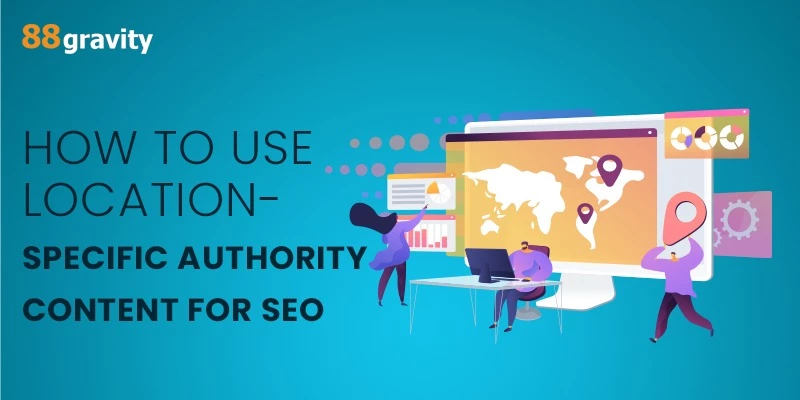
Using location-specific content is critical for improving SEO strategy. Businesses may position themselves as authoritative sources in some geographical regions by adapting information to those locations. This strategy entails developing meaningful, relevant, and instructive material that targets local issues, trends, and interests. When search engines recognise the geographical relevance and breadth of information given, such material is more likely to be prioritised in search results. As a result, organic traffic increases, user engagement increases, and the brand is established as a trusted resource within the targeted areas. An in-depth knowledge of local demographics, culture, and preferences is required to successfully implement location-specific authority content, allowing businesses to effectively connect with their intended audience on the local level while reaping the benefits of location-based SEO strategies that lead to increased exposure.
Using Location-Specific Authority Content To Improve SEO
One of the most effective Search Engine Optimisation (SEO) tactics is to generate and optimise location-specific authoritative content. You may attract an exceptionally relevant audience, boost your website's presence in local search results, and establish your company's name as a trustworthy resource by personalising your content to a specific geographical location. Here is a complete guide on using location-specific content for SEO:
1. Know Your Target Market and Niche:
- Investigate your niche's target audience's preferences, pain areas, and hobbies.
- Determine location-specific trends, local search phrases, and relevant keywords for your target audience.
2. Conduct Extensive Keyword Research:
- Use keyword research tools to identify area-specific keywords and phrases that are relevant to your company and location.
- Long-tail keywords that contain the precise place name, such as "top restaurants in [city]," "top activities in [region]," and so on, should be prioritised.
3. Produce High-Quality Location-Based Content:
- Creating in-depth, insightful, and valuable material that targets the particular needs of your local audience may be aided by using location-specific content.
- Create articles, blog posts, guidelines, and resources demonstrating your knowledge while emphasising the local context.
4. Improve On-Page Elements:
- Include location-specific keywords in your content, headers, meta titles, meta descriptions, and picture alt tags organically.
- Where applicable, put the location term in the URL structure of your website.
5. Create Local Backlinks:
- Contact local businesses, organisations, and authorities to discuss cooperation and partnerships that may result in backlinks.
- To create your visibility and authority in the local community, guest writes on local blogs and websites.
6. Create Location-Based Landing Pages:
- Location authority SEO may create custom landing pages for each place you wish to target, ensuring that the information is relevant and beneficial to that area.
- To develop trust, provide local testimonials, case studies, and success stories.
7. Make use of Google My Business (GMB):
- Claim and optimise your Google My Business listing by including up-to-date business information, photos, and reviews.
- Encourage consumers to post evaluations and immediately reply to both good and negative feedback.
- Geotagged Visual Content:
- Use geotags to indicate where photographs and videos were recorded when sharing them on your website and social media.
- This strengthens the local link and might increase the visibility of your content in location-based searches.
8. Performance Monitoring and Analysis:
- Location authority SEO content has the potential to Track the success of your location-specific content regularly with tools like Analytics for Google and Search Console.
- To determine the efficacy of your plan, examine important indicators such as traffic from natural sources, click-through rates, and keyword rankings.
9. Maintain Community Engagement:
- Participate in local social networking platforms, forums, and community activities.
- Participate in debates, respond to inquiries, and share your knowledge to position yourself as a local expert.
10. Content Updates and Refreshes:
- Update your location-specific material regularly to maintain it current and correct.
- Add new material, update statistics, and revise obsolete portions to keep their worth.
By following these precise guidelines, you can harness the power of SEO with local content, improving your SEO approach. Remember that increasing your trustworthiness, connecting with your local community, and constantly offering excellent content will all lead to increased search exposure, organic traffic, and ultimate company success.
Using Location-Specific Authority Content For SEO Can Provide A Number Of Advantages
Increased Relevance: Tailoring information to specific areas makes it more useful for local audiences, improving engagement and conversions.
Higher Rankings: Because search engines prioritise localised information, search rankings for relevant local keywords and phrases rise.
Attracting traffic:- Location-specific content draws targeted traffic from visitors who are more likely to convert since they seek information or services in that specific location.
Trust building strategy:- Increases trust by optimizing for local authority in your content. Accurate local information builds confidence and trust with local users, who regard your brand as an authoritative source inside their neighbourhood.
Reduced Competition: Local keywords and phrases frequently encounter less competition than wide, general keywords, giving you a better chance of ranking higher and being spotted by consumers looking nearby.
There Are Five Drawbacks To Adopting Location-Specific Authority Content For SEO
Small audience reach:- Location-specific content may only resonate with consumers from that location, limiting the potential reach and interaction from a larger audience.
Time-consuming and costly: Creating high-quality location-specific content requires substantial study and resources.
Scaling Issues: Scaling location-based SEO strategies can be difficult since they demand continuous quality and relevance while adjusting to diverse places.
Niche Relevance: Due to a lack of location-specific material in some businesses or themes, a finite number of topics may be covered.
Algorithmic Complexities: Because search engines' algorithms frequently prefer user intent and relevance over location, it is essential to balance producing useful material and meeting their needs.
How To Use The Location-Based SEO Content Technique:- 88gravity, SEO agency In Gurgaon
Start by conducting keyword research on search terms that are pertinent to your industry and geographic area. Find long-tail keywords with high search traffic that include Gurgaon-related terminology.
Design a content strategy that is focused on Gurgaon's regional characteristics. This could entail writing on regional news, culture, trends, and events. Make sure the local audience connects with your material.
Your Google My Business profile should be optimised. Give complete and up-to-date details about your company, including your address, contact information, a website link, and operating hours. Customers should be urged to post reviews.
Area-Specific Landing Pages: Establish unique landing pages for each target area, such as Gurgaon. These sites must provide distinctive and pertinent material highlighting the services you provide in that field.
Local Backlinks: The SEO agency in Gurgaon, 88gravity, has a team of experts who create high-quality backlinks from other nearby websites, directories, and companies. This establishes the authority of your website inside the neighbourhood.
Use geo-targeted keywords naturally in your content, meta descriptions, headers, and picture alt tags. Avoid cramming your content with keywords since it will hurt your SEO efforts.
Localised Blog Posts: Consistently post blog entries about Gurgaon. This might contain how-to articles, industry insights, and other materials pertinent to the region's target market.
Local Ratings and Research Studies: Our Leading SEO Agency in Gurgaon displays client testimonials and case studies from Gurgaon-based clients. The local community gains respect and trust as a result.
Social Media Interaction: Use social media channels to interact with the local audience. Share local news and events and communicate with Gurgaon followers.
Schema Markup: Use schema markup to offer structured data about your business to search engines, such as your address, phone number, and business type.
Mobile Optimisation: Check if your website is mobile-friendly, as many consumers will access it via mobile devices. Search engines use this as a ranking component as well.
Local Citations: Include your company's information in local internet directories and citation websites. Make sure your NAP (Name, Address, Phone Number) is consistent across all platforms.
Google Maps Integration: Incorporate Google Maps on the site to make it easier for people to discover your physical location.
User-Generated material: Encourage consumers to produce and share material about your Gurgaon business. Photos, reviews, and social media mentions may be included.
Regular updates: Keep your internet presence and local content updated with new information. Regular updates demonstrate that your company is active and connected with the local community.
Conclusion
Working with 88gravity gives the greatest SEO services in Gurgaon, paving the door to using the experience of a committed team of specialists. Businesses may position themselves for revenue growth with a personalised approach by using their strategic prowess. With 88gravity as a partner, the path to revenue optimization becomes guided, supported by the insights and abilities of an experienced team.




